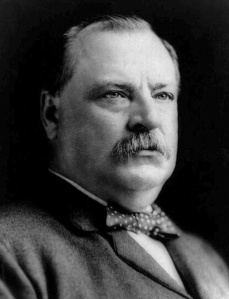Reading the first article of The Freeman, July – August 2012 Issue, I learned a lot about statesmanship. The article is written by Lawrence E. Reed. It is about Grover Cleveland. The article’s title is Cleveland Passed the Test of Character and Statesmanship.
Allow me to divide the lessons on statesmanship into two sections: ideas about statesmanship and qualities of a statesman.
Ideas about Statesmanship
The ideas about statesmanship are taken from two types of sources. One is from popular, but forgotten quotations penned by the writer and the other is from the reflection of the writer himself. I found three ideas related to statesmanship:
The first idea is about taxation. Grover Cleveland popularized the statement: “Though the people support the government, it is not the duty of the government to support the people.” This statement is considered unpopular in today’s standard. Public opinion resists this idea. The people are asking the state to provide for them. However, in order to give in to what the people ask, the government needs to expand its power and its revenue collection. Unknowingly, such trend is not beneficial to the public in the long run. It leads to the suppression of freedom.
A related statement from Cleveland is an appropriate critique to such expansion of the government’s power: “When more of the people’s sustenance is exacted through the form of taxation than is necessary to meet the just obligations of government, such exaction becomes ruthless extortion and a violation of the fundamental principles of a free government.”
Notice here that in the opinion of Cleveland, welfare state is actually leading to “ruthless extortion” and contrary to the character of a free government. Libertarians are correct that once people see that the government takes it as its duty to support the people, instead of being happy for the “generosity” of the government, the people must be cautious and be warned. It is an indication of interventionism heading to socialism. Furthermore, it is also an indication that free market economy is being suppressed.
The second idea focuses on loyalty. A certain Brodsky describes Cleveland as the “rarest of political animals” whose ultimate loyalty is not to the party, but to the country. The popular saying, “Public office is a public trust” is not merely rhetoric, but a reality for Cleveland.
And the third and final idea centers on the candidates’ qualifications for public office: honesty and statesmanship. Reed describes the honesty of Cleveland “as utterly incorruptible when he left office as he was when he first assumed it.” The second qualification is that of statesmanship. When looking for a candidate for public office, voters should seek for a candidate who is not simply a politician, but a statesman. Reed’s description is timely: “Every statesman is also a politician but not every politician is a statesman.”
Qualities of a Statesman
In a society that is becoming more and more interventionists in the passing of years, statesmanship is difficult to find among politicians. The quality of a Grover Cleveland is rare in a time where people are unconsciously heading to a socialist state. Anyway, we hope that libertarian ideas would educate increasing number of people through the web so that appreciation of statesmanship will become part of public opinion. Here is the list of qualities of a statesman as defined by Lawrence E. Reed:
- He or she doesn’t seek public office for personal gain or because it’s the only job he or she knows how to do.
- He stands for a principled vision, not for what he thinks citizens will fall for.
- He is well informed about the vicissitudes of human nature, the lessons of history, the role of ideas, and the economics of the marketplace.
- The statesman is a truth-seeker, which means he is more likely to do what’s right than what may be politically popular at the moment.
- You know where he stands because he says what he means and means what he says.
- He elevates public discussion because he knows what he’s talking about.
- He does not engage in class warfare or in other divisive or partisan tactics that pull people apart.
- He does not cynically buy votes with the money his taxes take from others, and
- He may even judge his success in office as much by how many laws he repealed or vetoed as by how many he passed.

No comments:
Post a Comment